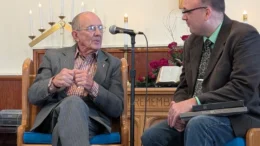A federal judge in Erie has ruled an Oil City man’s political sign that includes a vulgar word can remain on his property through the Nov. 3 election without repercussions from the city.
Furthermore, U.S. District Court Judge Susan Paradise Baxter extended her order to include “anyone in regards to their posting of political signage that is otherwise lawful.”
William E. Healy, 72, on Sept. 13 erected a sign that reads “F…. Trump 2020” on property he owns on Cooper Avenue.
The city did not respond and Healy installed the sign. Shortly after, the city police department said it had received complaints from neighbors and that Healy could be cited on a disorderly conduct charge.
Hadley then filed a civil lawsuit in federal court in Erie charging the City of Oil City was violating his client’s First Amendment rights. He also asked the judge for a temporary restraining order that would forbid the city from taking punitive action against Healy.
Hadley’s argument included his contention that “only obscenity, not vulgarity” can be outlawed and that the use of profanity is protected speech under the First Amendment.
The request for a temporary restraining order was granted by Baxter on Sept. 29 and allowed Healy to keep the sign up until Oct. 13, at which time a preliminary hearing would be held.
The newest court order was issued Wednesday.
The order, agreed to by both Hadley and the city’s legal counsel, extends the time for the signage display until Nov. 4, the day after the general election.
It directs any city employee or representative to not “commence or threaten any criminal, civil and/or administrative actions” against Healy or any other city resident who posts a political sign.
In addition, the judge imposed a deadline of Nov. 30 to receive the City of Oil City’s response to the lawsuit. If an agreement is not reached, Healy has asked that a jury trial be held.
“It’s huge now because the order is expanded to everyone and through Election Day – those were pressing issues,” said Hadley. “Biden, Trump – the city is constrained, through its own consent, as to what the signs can say.”
What’s next
The deadline set for the city to respond was extended to “allow both sides to work out the remaining issues and find the proper resolution,” said Hadley.
Those issues include punitive and compensatory damages on behalf of Healy.
“In state litigation against a city, the damages are limited to half a million dollars,” said Hadley. “But in federal lawsuits, there is no cap. We have no figure in mind. That’s a difficult question.”
The other topic involves what Hadley described as “remedial measures” that involve training and education for city staff.
“We will discuss things like training for police and code enforcement, mandatory in-service hours about the First Amendment, all measures that the city may have to comply with. The federal court can grant those things,” said the attorney.
“The city is so in the wrong in this. You, me, no one should have to grovel to exercise their rights.”
While the word affixed to Healy’s sign is profane and objectionable, its use falls under protected speech, said Hadley.
“Distasteful? Yes. But there is nothing distasteful about the First Amendment,” he said.
The city is being represented in the lawsuit by Paul D. Krepps of the Marshal, Dennehey, Warner, Coleman and Groggin law firm in Pittsburgh. The law firm is legal counsel for the city’s insurance carrier.









































